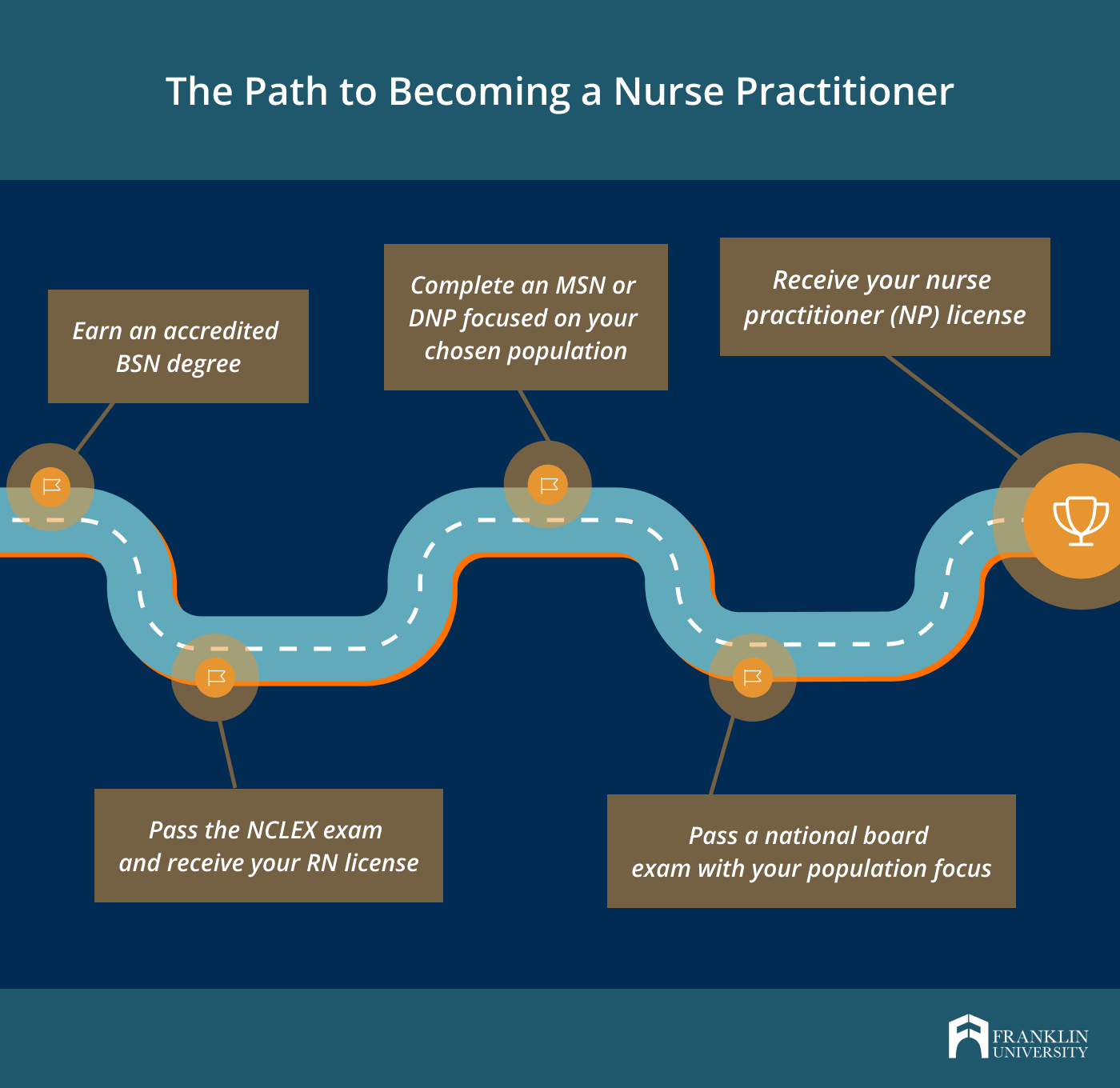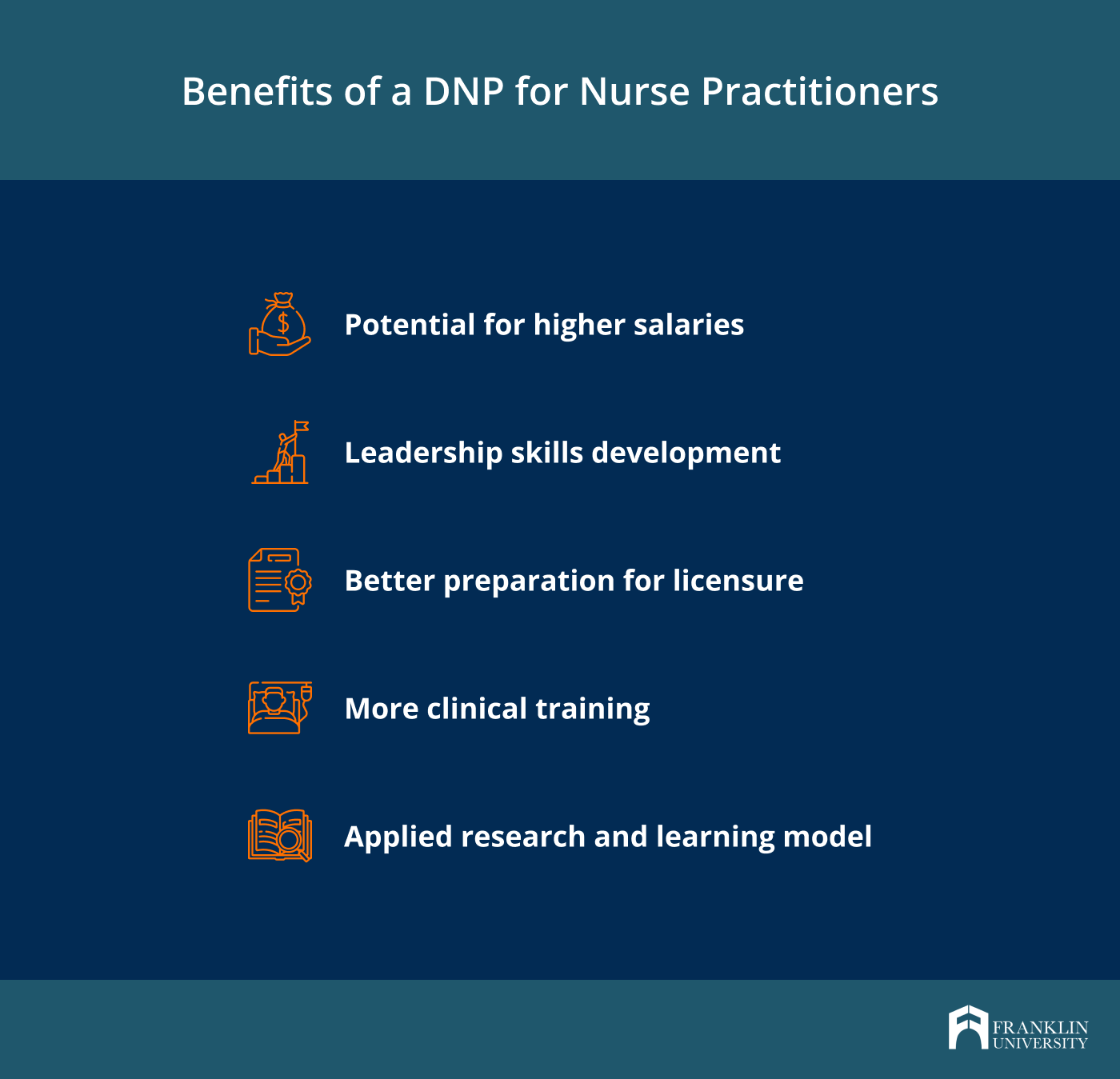Request Information
We're Sorry
There was an unexpected error with the form (your web browser was unable to retrieve some required data from our servers). This kind of error may occur if you have temporarily lost your internet connection. If you're able to verify that your internet connection is stable and the error persists, the Franklin University Help Desk is available to assist you at helpdesk@franklin.edu, 614.947.6682 (local), or 1.866.435.7006 (toll free).
Just a moment while we process your submission.

When Will a DNP Be Required for Nurse Practitioners?
In the wake of COVID-19, the U.S. is dealing with an unprecedented shortage of healthcare providers – and one of the greatest needs is for qualified nurse practitioners. The Bureau of Labor Statistics ranks this advanced practice role as the fastest-growing occupation in the United States, across all industries.
However, in light of shifting recommendations, the pathway to becoming a nurse practitioner can be confusing. Here’s what you need to know about when a DNP will be required.
Is a DNP a Nurse Practitioner?
First, it’s important to note that a Doctor of Nursing Practice (DNP) and a nurse practitioner (NP) are not the same.
A DNP is a terminal nursing degree, meaning that it represents the highest-level education available to nurses. On the other hand, nurse practitioner is the title of an advanced practice registered nurse (APRN) role that requires professional licensure.
While the DNP degree can be used to prepare to become a nurse practitioner, that’s not the only career that it’s relevant for. It’s also a popular option for nurses working toward leadership positions as well as other advanced practice roles like nurse anesthetist and nurse midwife.
In addition to advanced nursing coursework, DNPs teach nurses to implement evidence-based practice to drive quality improvement, patient safety and outcomes. It also helps nurses develop the critical skills they need to lead teams, make ethical decisions and use data to support population health.
Do You Need a DNP to be a Nurse Practitioner?
A DNP is one way to prepare for licensure as a nurse practitioner, but it is not required at this point. However, several major nursing organizations, including the American Association of Colleges of Nursing (AACN) and the National Organization of Nurse Practitioner Faculties (NONPF), are working to move the entry-level requirement for APRN roles, including nurse practitioner, from the MSN to the DNP by 2025.
As it stands currently, you can become a nurse practitioner if you have a BSN and active RN licensure, complete an MSN or DNP degree focused on your chosen specialty and population (such as family medicine or pediatrics) and pass a national board examination in that population/specialty. Once you’re licensed, you’ll also need to meet the requirements (including continuing education) to renew your license periodically.
Get a FREE guide to help you advance your career, featuring helpful advice and thoughtful insights from nursing experts.

When Will Nurse Practitioners Need a Doctorate?
Currently, the AACN and NONPF are working to shift the standard for nurse practitioner roles to DNP by 2025. The organizations previously attempted to make this change by 2015, without success, but it’s important to note that at that time DNP programs were still new and a limited number of students offered the degree. Today, DNP programs are available in all 50 states and the District of Columbia, making the transition much more feasible.
In April 2023, the NONPF reaffirmed its goal of making DNPs the standard by 2025. However, no state licensing boards have yet indicated that they plan to require a DNP for licensure as a nurse practitioner.
Just because the shift hasn’t yet occurred, though, doesn’t mean that it won’t eventually. The requirement has already changed for aspiring nurse anesthetists. The Council on Accreditation of Nurse Anesthesia Educational Programs, which independently committed to requiring a DNP by 2025, is no longer accrediting new master’s-level programs. As of 2022, all nurse anesthetist students must enroll in a doctoral program whether or not their state licensing board requires it.
Is a DNP Worth It for Nurse Practitioners?
Whether or not a DNP is required in the immediate future, the degree can offer nurse practitioners numerous benefits.
Potential for higher salaries
According to a 2022 Medscape report on APRN compensation, nurse practitioners with a doctorate earn $5,000 more each year than their peers with a master’s. This salary difference could compound over the length of a career, and a DNP could also potentially make you a more competitive candidate for higher-paying leadership roles.
Focus on leadership skills
DNPs focus heavily on leadership, quality improvement and systems evaluation, all capabilities that can make you a more effective leader and change agent.
Better preparation for licensure
DNP graduates pass their nurse practitioner certification exams at higher rates than MSN graduates, suggesting that DNP programs may provide better preparation.
Increased clinical experience
DNP programs generally require a higher number of clinical hours than MSN programs, so you can sharpen your skills to a higher degree.
Applied research and learning model
DNP programs include practicums and a scholarly project, allowing you to learn to drive quality improvement in the real world.

Build Your Nurse Practitioner Career at Franklin
If you decide that a DNP is your path to becoming a nurse practitioner, Franklin University’s accredited programs may be right for you.
Franklin offers three DNP tracks for nurse practitioners:
- Adult-Gerontology Primary Care Nurse Practitioner (AGPCNP)
- Family Nurse Practitioner (FNP)
- Psychiatric Mental Health Nurse Practitioner (PMHNP) track
All three tracks are available to registered nurses who hold a BSN as well as nurses with an MSN. If you don’t have a master’s degree, you’ll take two additional bridge courses to prepare you for the DNP curriculum.
Franklin’s DNP courses are delivered online, with flexible schedules to help you balance your career and your studies. With low tuition, transparent fees and an automatic $5,000 scholarship for all new DNP nurse practitioner students, you can earn your degree for less at Franklin.
Learn how you can become a nurse practitioner with a DNP from Franklin.





